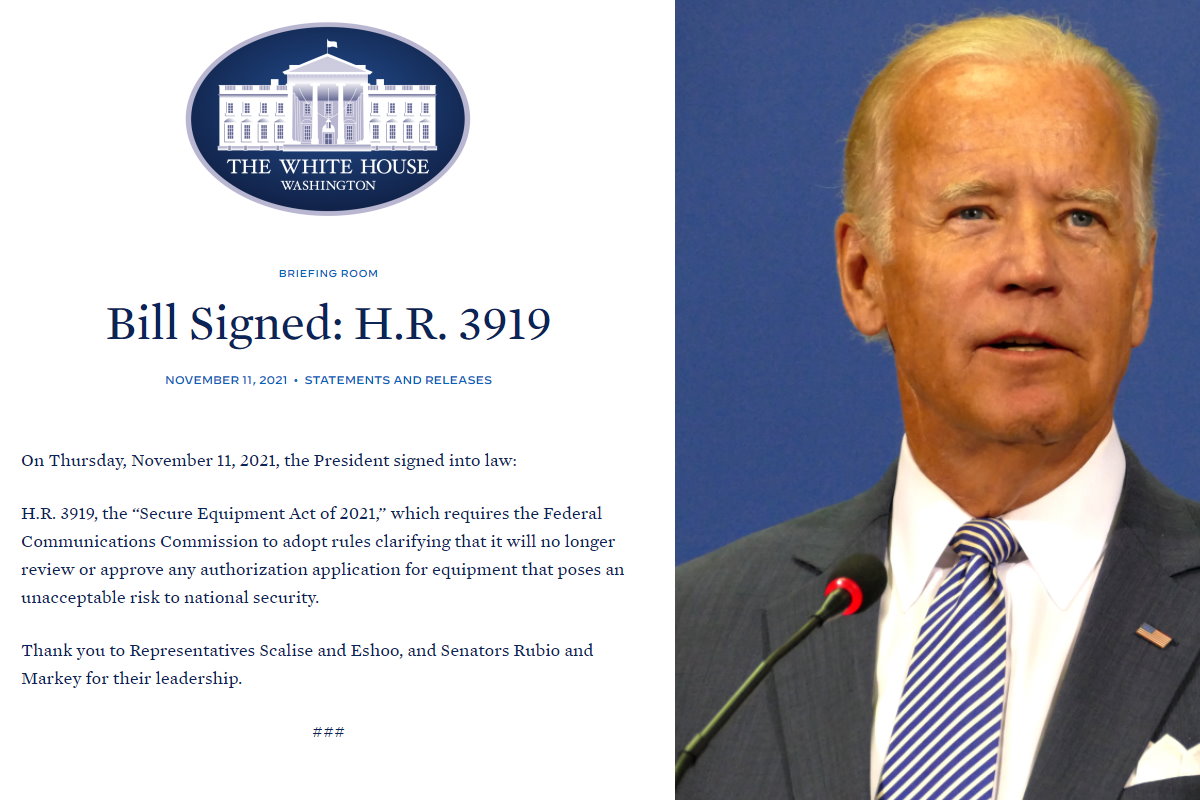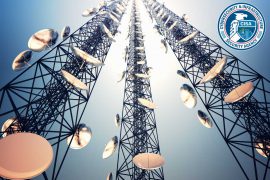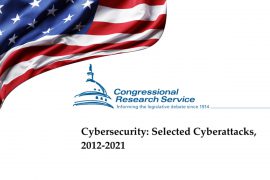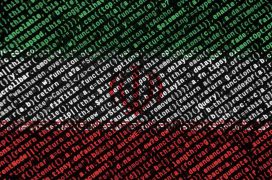Secure Equipment Act blocks technology manufactured by companies that pose a national security threat

U.S. President Joe Biden has signed into law a bipartisan, bicameral legislative bill that requires the Federal Communications Commission (FCC) to adopt rules clarifying that it prevents any authorization application for equipment that poses an unacceptable risk to national security. The new Secure Equipment Act also ensures that the federal agency prohibits the authorization of radio-frequency devices that pose a national security risk.
The H.R. 3919, titled, ‘Secure Equipment Act of 2021,’ directs the FCC to adopt rules clarifying that it will no longer review or issue new equipment licenses to companies, such as the People’s Republic of China (PRC) state-backed firms Huawei and ZTE, as part of the agency’s ‘Covered Equipment or Services List’ that pose a national security threat. The FCC is required to maintain this list under the Secure and Trusted Communications Networks Act of 2019, which laid out detailed criteria for determining what communications equipment or services pose an unacceptable risk to U.S. safety.
The bill was introduced by U.S. House of Representatives Anna G. Eshoo for California, and Steve Scalise for Louisiana, in addition to U.S. Senators Edward J. Markey, a Democrat from Massachusetts, and Marco Rubio, a Republican from Florida.
Last year, the FCC adopted new rules to require that U.S. telecommunications carriers rip and replace equipment provided by the ‘covered’ companies. While that was an important step, those rules only apply to equipment purchased with federal funding. The very same equipment could still be used if purchased with private or non-federal government dollars.
The Secure Equipment Act was brought in to close this loophole and further prevent identified security threats from having a presence in U.S. telecommunications networks. Subsequently, the FCC initiated a rulemaking that mirrors the lawmakers’ proposal. The measure signed into law yesterday builds on the FCC’s ongoing proceeding.
“I’ve fought for over a decade to address vulnerabilities in our telecommunications infrastructure that directly impact our national security,” Rep. Eshoo said in a press statement. “Equipment made by Huawei and ZTE, companies linked to the Chinese Communist Party, increase the vulnerabilities of our telecommunication systems and put privacy and safety of Americans at risk. Now the FCC is prohibited from issuing licenses for any equipment made by companies that pose a threat to our national security,” she added.
“The Secure Equipment Act of 2021 will improve our safety as a nation by ensuring that untrustworthy communications equipment is not authorized for use within our borders,” said Jessica Rosenworcel, FCC Chairwoman. “I thank Senators Markey and Rubio and Representative Eshoo and Scalise for their leadership and for helping send a strong, bipartisan signal that the United States is serious about developing a robust market for secure 5G alternatives.”
FCC Commissioner Brendan Carr said that the “Secure Equipment Act is now the law of the land and will ensure that insecure equipment from Huawei, ZTE, and other untrustworthy entities can no longer be inserted into our communications networks. This gear poses an unacceptable risk to our national security. and I am pleased with the overwhelming support their legislation has received in Congress to close the Huawei Loophole, and for President Biden’s signature today enacting this important reform.”
Last month, after the bill passed in the U.S. Senate, Carr said it will help to ensure that insecure gear from companies like Huawei and ZTE can no longer be inserted into America’s communications networks. “We have already determined that this gear poses an unacceptable risk to our national security, so closing what I have called the ‘Huawei loophole’ is an appropriate action for us to take,” he said in a statement. “I commend the efforts by these members, who have consistently championed policies that strengthen our national security and protect America’s communications networks.”
The FCC revoked and terminated also last month on security grounds China Telecom (Americas) Corporation’s ability to provide domestic interstate and international telecommunications services within the U.S., in an order. The federal agency based its revocation decision on the totality of the extensive unclassified record alone, and its public interest analysis finds that the present and future public interest, convenience, and necessity are no longer served by China Telecom’s retention of its section 214 authority.
Apart from legislative measures, the U.S. administration is also seeking information on Chinese participation in the international standards development process. The U.S. Department of Commerce’s National Institute of Standards and Technology (NIST) issued earlier this month a Request for Information on PRC policies and influence in the development of international standards for emerging technologies.
“We hope to hear from many U.S. organizations about their experiences with the international standards development process,” Deputy Secretary of Commerce Don Graves, said in a media statement, earlier this month. “U.S. participation in this process is extremely important for ensuring our products are competitive around the world. We want to help ensure its continued success, even in a changing international environment.”










